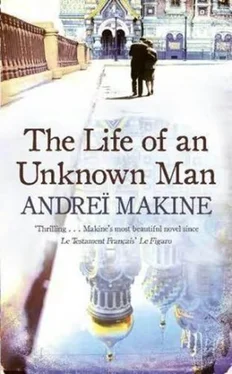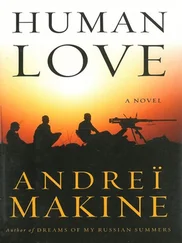Andreï Makine - The Life of an Unknown Man
Здесь есть возможность читать онлайн «Andreï Makine - The Life of an Unknown Man» весь текст электронной книги совершенно бесплатно (целиком полную версию без сокращений). В некоторых случаях можно слушать аудио, скачать через торрент в формате fb2 и присутствует краткое содержание. Жанр: Современная проза, на английском языке. Описание произведения, (предисловие) а так же отзывы посетителей доступны на портале библиотеки ЛибКат.
- Название:The Life of an Unknown Man
- Автор:
- Жанр:
- Год:неизвестен
- ISBN:нет данных
- Рейтинг книги:3 / 5. Голосов: 1
-
Избранное:Добавить в избранное
- Отзывы:
-
Ваша оценка:
- 60
- 1
- 2
- 3
- 4
- 5
The Life of an Unknown Man: краткое содержание, описание и аннотация
Предлагаем к чтению аннотацию, описание, краткое содержание или предисловие (зависит от того, что написал сам автор книги «The Life of an Unknown Man»). Если вы не нашли необходимую информацию о книге — напишите в комментариях, мы постараемся отыскать её.
The Life of an Unknown Man — читать онлайн бесплатно полную книгу (весь текст) целиком
Ниже представлен текст книги, разбитый по страницам. Система сохранения места последней прочитанной страницы, позволяет с удобством читать онлайн бесплатно книгу «The Life of an Unknown Man», без необходимости каждый раз заново искать на чём Вы остановились. Поставьте закладку, и сможете в любой момент перейти на страницу, на которой закончили чтение.
Интервал:
Закладка:
They came looking for her an hour later: a car of the same type as before, they were nicknamed “black crows,” the same uniforms. Volsky came out first and it was him they spread-eagled brutally across the hood. The second car arrived, the agents emerging from it snatched the little case from Mila’s hands that she planned to take with her. “Look at what’s inside, it’s very important,” she shouted, and while the two agents, intrigued, were rummaging through the few items of clothing and toiletries, she threw herself toward Volsky, they kissed and, despite the arms already separating them, succeeded in whispering a few words. “Every day look at the sky, at least for a moment. I’ll do the same…” They were each thrown into one of the cars. Volsky could not remember which of them, he or Mila, had suggested looking at the sky, knowing that the other would also see it. He just had the bitter taste of blood in his mouth, Mila’s lips were still bleeding.
The cars drove away with absurd haste along the dirt road that led around the house. For several seconds Mila and Volsky saw a youth running after this black motorcade, waving his arms and shouting, as if he wanted to catch up with it. In the pale light of the evening his red hair glowed like a cluster of fruits on a service tree.
The hardest moment after the arrest was this interrogation. The investigating officer was young but knew that, whatever the prisoner’s attitude, he must hit him. Only he was not yet in full command of torture techniques. He struck clumsily and too hard. Volsky, his hands tied behind his back, fell, pressing his head against one shoulder to hide his face. Inexplicably the blows stopped. He turned to look at the officer and could not repress an “oh” of surprise. The man was standing upright, his head thrown back, pinching his nostrils, his fingers spotted with blood. “Open the window, take a little ice…,” suggested Volsky in a deliberately neutral voice. The officer snorted a kind of oath but, strangely, obeyed. The interrogation room was in the cellar, a basement window, protected by thick bars, looked out onto a sidewalk covered in fresh snow. The officer opened it, seized a fistful of flakes, pressed it against his nose. The bleeding calmed down and Volsky sensed that moment when a human mind wavers between compassion and scorn. He was to experience this several times during his years in the camp.
A rapid sequence of expressions passed across the young officer’s face: Start hitting even harder, to punish the witness of this ridiculous discomfiture? Resume questioning as if nothing had happened? Or else… It was the expression in the prisoner’s eyes that astonished him: a perfect detachment, an almost smiling lucidity. The officer saw that the man thrown to the ground was staring at the tiny trace of blue through the window, the line of sky that he could manage to see from the floor.
He helped Volsky back onto the stool, and repeated his question, to which he had received only negative replies.
“I will ask again. Do you admit that you intended to fly the German aircraft exhibited at the so-called Blockade Museum and drop bombs on Smolny, in order to kill the members of the city’s leadership?”
If Volsky had not previously heard tales of demented accusations of this type he would have thought he was going mad. But this forensic delirium was no longer a secret, people spoke of it, both terrified and almost elated by the excessiveness of the absurdity: such and such a person had been shot for attempting to poison the waters of all the great rivers in the country, another was said to have contrived to create a dozen subversive organizations in a village of a hundred inhabitants… And now here he was, planning to take off in an aircraft riddled with shrapnel that had had its undercarriage torn away!
He was silent. There was not much choice. Deny it and lay himself open to more blows? Agree and sign his own death warrant?
Suddenly the investigating officer’s voice slid down into a whisper: “Say you wanted to bomb Smolny to eliminate anti-Party factionalists at the heart of the city’s leadership.” And Volsky saw he was already putting this crackpot confession into writing. The young officer was indeed engaged in fabricating a criminal, but a criminal inspired by a praiseworthy desire to struggle against the enemies of the Party and its Guide. Lowering his head slightly, Volsky could see through the basement window a little snow and the reflection of the sky in a windowpane.
Every day in the camp he found a moment of freedom to meet Mila’s gaze up in the sky.
The life of a prisoner did not destroy him. He had often had occasion to sleep on the ground at the front, in mud or under snow. Here the bedsteads in huts equipped with stoves could almost seem comfortable. Cutting down trees was painful work but his arms retained the knack of handling the weight of shells. Hunger and scurvy were killers and yet, compared with the hundred and twenty-five grams of bread during the blockade, the poorest food seemed lavish.
As for the length of his sentence, four and a half years in a camp, it was enough to make you smile: ten years of hard labor was the modest norm here. “Praise be for that officer’s nosebleed,” Volsky would say to himself.
And in the worst hours of despair there was this sky, whether gray, luminous, or nocturnal, and the link created by the power of a single gaze, beyond the world of human beings.
The clemency of his own sentence made him hope for an even lighter penalty for Mila. What could she be accused of? Bringing a notebook stained with earth to the museum? Volsky contrived to believe her acquitted, free, settled with the children in their old izba: in the evening she would step outside under the quivering of the first stars, look up at the sky… Then this hope became muddied, he recalled that for a long time the repressions had parted company with all logic. He, who had never set foot in the cockpit of an aircraft, was said to have decided to bomb Leningrad. Even crazier intentions could have been attributed to Mila. She might have been sent to a camp thousands of miles from the one where he was!
This supposition was a hideous torment. And yet, on occasion, he ventured on a declaration whose harsh and beautiful truth he feared himself: nothing could alter the moment when their eyes rose up to encounter one another. Then he pictured Mila amid white fields, her face uplifted toward the slow swirling of the snow.
This vision helped him not to live in hatred, which was a good way of surviving in the camp. He understood this when one day in spring he found himself buried under a pile of logs: a gigantic pyramid of cedar trunks, which the prisoners were preparing to float downriver. The breakup of the ice was happening early and more violently than usual. The stack of tree trunks stirred, shaken by the vibration of the ice floes, waking into life on that great Siberian river. And all at once the mountain of logs began rolling, scattering. The timber was swallowed into cavities in the ice shelf, hurtled into the water, rose up vertically, fell back, reared up into walls that caved in… Several prisoners were trapped by the collapse. Two or three vanished into the river. They were able to save one of them, whose shoulder was shattered.
Volsky remained pinned to the ground low down on the shore, close to the menacing procession of disintegrating ice floes. His chest crushed, his legs caught in the tangle of tree trunks, he could neither cry out nor move. When he regained consciousness night had fallen and he guessed that the search, if there had been one, had not been very thorough. A prisoner’s life was worth nothing and nobody wanted to lose his own by venturing into a chaotic mass of logs that threatened to subside and slide into the river at any moment. They must have reckoned that he had drowned.
Читать дальшеИнтервал:
Закладка:
Похожие книги на «The Life of an Unknown Man»
Представляем Вашему вниманию похожие книги на «The Life of an Unknown Man» списком для выбора. Мы отобрали схожую по названию и смыслу литературу в надежде предоставить читателям больше вариантов отыскать новые, интересные, ещё непрочитанные произведения.
Обсуждение, отзывы о книге «The Life of an Unknown Man» и просто собственные мнения читателей. Оставьте ваши комментарии, напишите, что Вы думаете о произведении, его смысле или главных героях. Укажите что конкретно понравилось, а что нет, и почему Вы так считаете.









